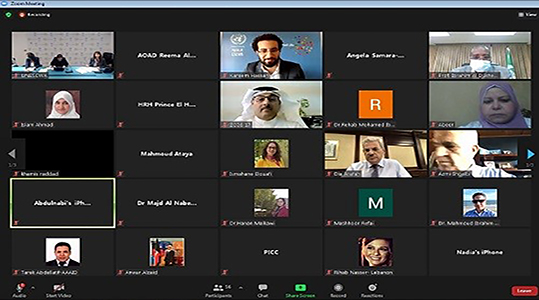The Union of Arab Chambers participated in the fourth dialogue webinar on tracking food security in the Arab region in the post-Covid-19 phase, which was held on November 23, 2020, through “video conference”, organized by the United Nations Economic and Social Commission for Western Asia (ESCWA) in cooperation with the West Asia and North Africa Institute (WANA), as part of the Sustainable Development Dialogue Series in the Arab Region.
The panel discussed re-imagining food security in the Arab region in the post-Covid-19 phase, and the main findings of the Arab Report for Sustainable Development 2020 and the progress made towards sustainable development goals in the Arab region were presented, with a focus on the second goal (zero hunger) and the role of technology in promoting sustainability, ensuring a green recovery from this crisis, building resilience to withstand future crises, and strengthening regional cooperation to deal with dependence on food imports.
The participants to the webinar stated that two-thirds of the people who suffer from hunger live in countries affected by conflicts, as these countries (Iraq, Libya, Syria, Sudan and Yemen) have witnessed the complete destruction of the production infrastructure, the severe disruption of food value chains, and the frequent abandonment of agricultural lands, due to damage or population displacement.
According to the participants, the whole world is suffering from a large-scale human crisis, which has new negative repercussions, as the Coronavirus came at a time when food systems in the Arab region were burdensome, and food security was a threat in many Arab countries, as they spent $110 billion annually on food imports. As a result of this pandemic, levels of undernourishment have increased for a large segment of the Arab community, in addition to an increase in the food insecurity index, which affects 16 million people.
Through the concluding recommendations, the participants called for the need to adopt overlapping systems for formulating long-term policies related to food security, by linking the issue of food security with water, energy, agriculture and the sustainable use of resources. In addition to the importance of using technology in food security, and investing in science and technology, as linking science to politics has become an urgent necessity. The participants also highlighted the importance of collecting information, converting it into data and standards, and presenting it in a simple and understandable way to help decision-makers concerned with making and modifying policies.

